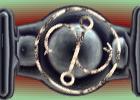
The Charm of the Stones Consecrated to Diana |

To find a stone with a hole in it is a special sign of the favour of Diana. He who does so shall take it in his hand and repeat the following, having observed the ceremony as enjoined: —
| Scongiurazione della pietra bucata. | Invocation to the Holy-Stone.1 [1. Properly, the stone with a hole in it. But such a stone is called holy on shipboard, and here it has really a claim to the name.] |
|---|---|
|
Una pietra bucata |
I have found |
|
Mi alzo la mattina al alba, |
I rise in the morning by the earliest dawn, |
|
Diana fu quella |
It was Diana who did come to me, |
|
Diana, tu che siei la regina |
Great Diana! thou [1. This is an obscure passage, but I believe that I have given it as the poet ineant or felt it.] |
|
Una altra volta ti scongiuro |
Or I may truly at another time |
|
[Here we have again the threatening the deity, just as in Eskimo or other Shamanism, which represents the rudest primitive form of conjuring, the spirits are menaced. A trace of this is to be found among rude Roman Catholics. Thus when St. Bruno, some years ago, at a town in the Romagna, did not listen to the prayers of his devotees for rain, they stuck his image in the mud of the river, head downwards. A rain speedily followed, and the saint was restored in honour to his place in the church.] | |
[Il sasso a palla.]
The finding a round stone, be it great or small, is a good sign (e buono augurio), but it should never be given away, because the receiver will then get the good luck, and some disaster befall the giver.
On finding a round stone, raise the eyes to heaven, and throw the stone up three times (catching it every time), and say: —
| Italian | The Conjuration. |
|---|---|
|
Spirito del buono augurio! |
Spirit of good omen, |
|
Se danari da qualchuno avanzerò |
Should I lend money unto any man |
|
Se dorme to desterai, |
And if he sleeps, awake him with a twitch, |
|
E tu col tuo Brié-brié, le dirai, |
So teach him with thy ceaseless “Brié — brié!” |
|
Cosi il debitare il giorno appresso, |
And so my debtor on the following day |
|
Se colla mia amante saro’ adirato, |
Or should I quarrel with her whom I love, |
  
|